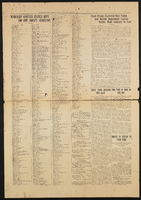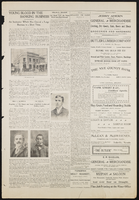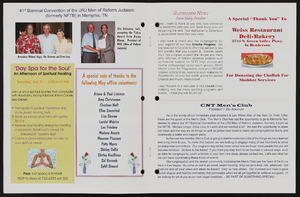Search the Special Collections and Archives Portal
Search Results
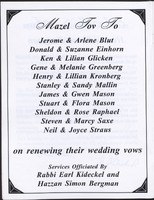
Program for The Wedding event at Temple Beth Sholom, June 11, 1995
Date
Archival Collection
Description
Booklet for the Wedding celebrations and vow renewals of couples at Temple Beth Sholom.
Text

Hamed Ahmady oral history interview: transcript
Date
Archival Collection
Description
Oral history interview with Hamed Ahmady conducted by Stefani Evans on March 22, 2023 for the Reflections: the Las Vegas Asian American and Pacific Islander Oral History Project. Interviewed by Stefani Evans. Culinary Union Local 226 organizer Hamed Ahmady recalls his childhood as the oldest of six children in Mazar-e Sharif in northern Afghanistan. As an child, he remembers hearing about the September 11, 2001 attack in New York while living in a Taliban-controlled city on a television connected to a concealed antenna that received signals from Uzbekistan. He recalls how, one month after he graduated high school, he became an translator for the U.S. Army, which he did for more than four years. He talks about securing his Special Immigrant Visa (SIV); landing in Los Angeles, California in 2013 and moving his family to the United States; and supporting his siblings and parents in Afghanistan. He also discusses relocating his family from California to Las Vegas, Nevada in 2018, finding a mosque community, and working with Culinary Union Local 226.
Text

Pete Barbutti interview, September 24, 2008: transcript
Date
Archival Collection
Description
Pete Barbutti (also spelled Barbuti) played the accordion, the piano, and the trumpet. He was also a comedian and appeared numerous times on the Tonight Show starring Johnny Carson and toured with Nat King Cole. He and his family have lived in Las Vegas since 1960
Text

Transcript of interview with Roscoe Wilkes by Claytee White, March 19, 2009
Date
Archival Collection
Description
Roscoe Wilkes was born in Bonanza, Colorado, and moved with his family to Pioche, Nevada for what his sister called a 75-year pit stop. Soon after their move to this rural Nevada town, Roscoe’s mother became a widow, raising two children during the Depression. Like many families in Pioche, the Wilkes’ made due with what they had, and were creative in sustaining their livelihoods. Roscoe has never stood still. Before enlisting in the military, Roscoe worked various jobs, as a PBX systems operator, a lead zinc miner, and grade school teacher, before enlisting. During World War II, Roscoe became a prisoner of war in Romania, and was rescued a few months later when the Germans began retreating. Returning to the United States after his release, he relocated to a base in California, and married. As soon as Roscoe was relieved of his military service, he took advantage of the then new G.I. Bill and enrolled in the University of Southern California School of Law. He immediately took his degree to Pioche, soon becoming its district attorney, and later a judge. He spent 18 years based in Seattle as a federal administrative law judge, hearing cases prosecuted by the Coast Guard. Roscoe ended his 45-year career in law in 1990, and moved to Boulder City, where four generations of Wilkes live.
Text

Transcript of interview with Dick Chapter by Stan Hawkins, March 6, 1979
Date
Archival Collection
Description
On March 6, 1979, Stan Hawkins interviewed furniture refinisher, Richard T. Chapter (born January 28th, 1933 in Maine) at his home in Las Vegas, Nevada. During the interview, Richard recalls swimming at the old ranch, going into the furniture refinishing business, and the cost of living in Las Vegas. He also discusses Howard Hughes, the Boulder Dam, and the Union Pacific Railroad. Richard’s wife is also present during the interview and interjects comments about the old Mormon Fort, gambling, local business, and the weather in Las Vegas.
Text

Transcript of interview with Mindy Unger-Wadkins by Barbara Tabach, October 28, 2015
Date
Archival Collection
Description
In this interview, Unger-Wadkins discusses growing up in Las Vegas? close-knit Jewish community in the 1960s and 1970s, and involvement with various Jewish youth organizations and activities. She also describes her career in public relations, reflecting upon the unique challenges faced when interacting with the public, and with politics, in her positions. Unger-Wadkins ends by describing her current work in land development, particularly the history of the Three Kids Mine and the technical and political process of ensuring the land is suitable as a residential area.
Text
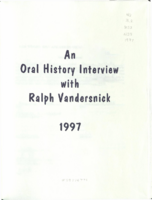
Transcript of interview with Ralph Vandersnick by Dennis McBride, October 18, 1997
Date
Archival Collection
Description
Ralph Vandersnick was interviewed on October 18, 1997. Ralph owns Snick's Place, the longest-operating gay bar in Las Vegas and whether he'd agree or not, he's one of the most respected members of the Las Vegas gay community.
Text

